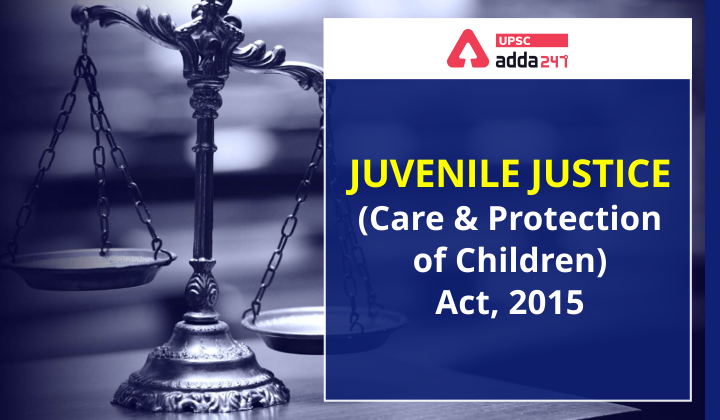Table of Contents
Juvenile Justice (Care and Protection of Children) Act, 2015- Relevance for UPSC Exam
- GS Paper 2: Governance, Administration and Challenges- Government policies and interventions for development in various sectors and issues arising out of their design and implementation.
Get free video for UPSC CSE preparation and make your dream of becoming an IAS/IPS/IRS a reality
Juvenile Justice (Care and Protection of Children) Act, 2015- Context
- The Women and Child Development Ministry plan to bridge the legislative gap between the Hindu Adoptions and Maintenance Act (HAMA)and the Juvenile Justice (Care and Protection of Children) Act, 2015 that has forced adoptive parents under HAMA to move the court to take their child abroad.
- It will issue a notification to set up a mechanism for NoCs for adoptions under
- This will also be in compliance with the Hague Convention on Inter-Country Adoptions to prevent child trafficking and is governed through the JJ Act 2015.
Juvenile Justice (Care and Protection of Children) Act, 2015- Key Features
- Definition of Juvenile in India: Juvenile Justice (Care and Protection of Children) Act,2015 defines “Juvenile” or “Child” as a person who has not completed 18 years of age.
- The JJ Act changed the nomenclature from ‘juvenile’ to ‘child’ or ‘child in conflict with law’.
- Categorization of crime: The JJ Act categorizes the crimes committed by children into three categories- Petty, Serious, and Heinous Offences.
- Provides an Exception for Heinous crimes: In the case of heinous crimes, Children in the age group of 16 – 18 years can be treated as adults provided that the Juvenile Justice Boards (JJB) has assessed the child’s physical and mental capacities and certify the child.
- Institutional Machinery: The JJ Act provides for the mandatory setting of the following JJBs and Child Welfare Committees (CWCs) in each district having at least a woman member in each JJB/CWC.
- Juvenile Justice Boards (JJB): This is a judiciary body that acts as a separate court for children detained or accused of a crime under the JJ Act.
- Child Welfare Committee: Set up by state governments as per The JJ Act.
- CWCs have the power to dispose of cases for the care, protection, treatment, development and rehabilitation of the children in need of care and protection, as well as to provide for their basic needs and protection.
- The committee also certifies the Child as legally free for the adoption process.
- All Child Care Institutions (CCIs) across India were to get themselves registered under the Act within six months from the date of commencement of the Act.
- This will facilitate better monitoring and quality standards in these CCIs.
- Central Adoption Resource Authority (CARA): The JJ Act provided CARA a statutory body status under the Act. This will facilitate better performance and functioning of CARA.
National Environmental Engineering Research Institute (NEERI)




 TSPSC Group 1 Question Paper 2024, Downl...
TSPSC Group 1 Question Paper 2024, Downl...
 TSPSC Group 1 Answer key 2024 Out, Downl...
TSPSC Group 1 Answer key 2024 Out, Downl...
 UPSC Prelims 2024 Question Paper, Downlo...
UPSC Prelims 2024 Question Paper, Downlo...






